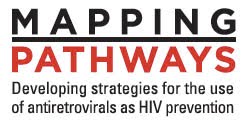via HuffPost Chicago, by Gregory Trotter
 For the 1.2 million Americans living with HIV, the Affordable Care Act will be utterly life-changing. For some, it will be life-saving.
For the 1.2 million Americans living with HIV, the Affordable Care Act will be utterly life-changing. For some, it will be life-saving.
Just ask Will Wilson, 58, who was diagnosed with "full-blown AIDS" in 2002.
"It will basically mean freedom," said Wilson, a Chicago resident and an advocate for the Illinois Alliance for Sound AIDS Policy.
For the first time, Wilson will be able to purchase private insurance without fear of being rejected for his preexisting condition. The former graphic designer will be able to aggressively re-enter the job market without risking his continuous access to lifesaving HIV drugs that cost him $3,000 a month.
He'll have options he's never had.
This week, the Supreme Court has heard oral arguments on the constitutionality of the Affordable Care Act, specifically the legality of the individual mandate provision and the expansion of Medicaid. It is slated to rule in June on what is widely considered to be the most important Supreme Court case in decades. Many people living with HIV/AIDS and other preexisting conditions will be hoping and praying that the court rules in favor of health care reform.
In January, the AIDS Foundation of Chicago (AFC) signed on to a legal brief -- along with 130 other HIV/AIDS organizations throughout the country -- asserting that the Affordable Care Act is, in fact, constitutional. It's also necessary to stopping the AIDS epidemic in the United States.
"The list of supporters for our brief urging the court to uphold the ACA continues to grow because of the law's enormous potential to impact the domestic AIDS epidemic," said Scott Schoettes, HIV Project Director for Lambda Legal, the legal firm that submitted the brief.
About 24 percent of people living with HIV are uninsured, according to data from the U.S. Department of Health and Human Services. The majority of people living with HIV depend on Medicaid and Medicare for medical treatment.
Read the Rest.
[Content that is linked from other sources is for informational purposes and should not construe a Mapping Pathways position.]
 For the 1.2 million Americans living with HIV, the Affordable Care Act will be utterly life-changing. For some, it will be life-saving.
For the 1.2 million Americans living with HIV, the Affordable Care Act will be utterly life-changing. For some, it will be life-saving. Just ask Will Wilson, 58, who was diagnosed with "full-blown AIDS" in 2002.
"It will basically mean freedom," said Wilson, a Chicago resident and an advocate for the Illinois Alliance for Sound AIDS Policy.
For the first time, Wilson will be able to purchase private insurance without fear of being rejected for his preexisting condition. The former graphic designer will be able to aggressively re-enter the job market without risking his continuous access to lifesaving HIV drugs that cost him $3,000 a month.
He'll have options he's never had.
This week, the Supreme Court has heard oral arguments on the constitutionality of the Affordable Care Act, specifically the legality of the individual mandate provision and the expansion of Medicaid. It is slated to rule in June on what is widely considered to be the most important Supreme Court case in decades. Many people living with HIV/AIDS and other preexisting conditions will be hoping and praying that the court rules in favor of health care reform.
In January, the AIDS Foundation of Chicago (AFC) signed on to a legal brief -- along with 130 other HIV/AIDS organizations throughout the country -- asserting that the Affordable Care Act is, in fact, constitutional. It's also necessary to stopping the AIDS epidemic in the United States.
"The list of supporters for our brief urging the court to uphold the ACA continues to grow because of the law's enormous potential to impact the domestic AIDS epidemic," said Scott Schoettes, HIV Project Director for Lambda Legal, the legal firm that submitted the brief.
About 24 percent of people living with HIV are uninsured, according to data from the U.S. Department of Health and Human Services. The majority of people living with HIV depend on Medicaid and Medicare for medical treatment.
Read the Rest.
[Content that is linked from other sources is for informational purposes and should not construe a Mapping Pathways position.]

No comments:
Post a Comment